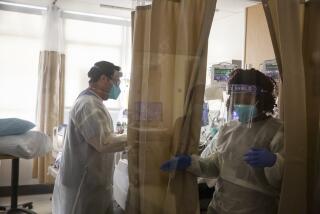Limiting resident physicians’ work hours to save lives
- Share via
Forty years ago this month, a study published in the New England Journal of Medicine revealed that sleep-deprived resident physicians reading electrocardiograms made twice as many errors as their rested counterparts. Back then, in 1971, there were no limits on the hours that medical residents could be scheduled to work. Thirty-six-hour on-call shifts were the norm.
Under new rules that take effect Friday, newly minted medical school graduates will start their internships with shifts limited to no longer than 16 hours. However, residents in their second years or above will still be allowed to work 28-hour shifts with little or no sleep.
As a retired surgeon who has spent years working to improve patient safety and as a mother whose child died while under the care of a poorly supervised, exhausted intern, we are frustrated with this lack of progress.
There have been scores of published studies linking sleep deprivation with deterioration in human performance. Much of that research has focused specifically on residents. At the behest of Congress, that evidence was reviewed by the Institute of Medicine in 2008. The institute concluded that “the scientific evidence base establishes that human performance begins to deteriorate after 16 hours of wakefulness,” and called for elimination of resident shifts exceeding 16 hours without sleep. It also sought improvements in the organization and supervision of residents, and a strengthening of oversight of the Accreditation Council for Graduate Medical Education, the professional body that oversees residency training.
The institute’s conclusion that extremely long work shifts are unsafe infuriated many leaders in academic medicine. The culture of medical training is attached to the idea that resident physicians must work long hours to gain experience, and it extols the virtues of the heroic, lone physician despite the proven safety of team-based care. But the evidence is clear that little learning occurs after working 16 hours.
Hospitals too are attached to the notion of long shifts, in part because of cost concerns: Resident physicians represent a source of cheap labor, and if their hours were significantly reduced, hospitals would have to pay other providers to step in. But there is another way of looking at this concern: If more reasonable hours would reduce complications and deaths, as many experts believe is the case, the resulting savings could more than make up for this extra cost.
Friday’s change in the rules, along with new guidelines for enhanced supervision and training in patient safety, are a step in the right direction. But Congress’ core concern — fatigue — remains inadequately addressed.
The accrediting council’s resistance to limiting hours for all of the nation’s 110,000 resident physicians ignores growing evidence that more humane work hours not only decrease the risk of patient harm, they also improve resident education and morale.
At a round-table at Harvard Medical School last year, 26 experts representing hospitals, medical educators, consumers, patient safety experts, sleep scientists, policymakers, residents and medical students heard from representatives of residency training programs in medicine, general surgery and obstetrics that have implemented the 16-hour limit. Their experiences show that limiting work hours does not unduly burden teaching hospitals and can enhance the educational experience for residents, while also saving lives. The recommendations from this meeting have just been published and offer a road map for teaching hospitals to go beyond the council’s requirements to eliminate the extreme fatigue that contributes to medical errors.
Recent studies indicate that medical errors and adverse medical events affect up to one-third of hospital patients and account for as many as 180,000 deaths annually. And in spite of numerous patient safety interventions over the last decade, the number of patients injured by medical care has not fallen. In April, U.S. Health and Human Services Secretary Kathleen Sebelius launched a program to address preventable medical injuries. We believe that failure to address the resident fatigue factor is one reason there has been little change.
The public, it turns out, shares our view. Opinion polls reveal that Americans reject the view that a doctor’s training must include punishingly long hours. In one recently published poll, 80% of respondents said they would ask for a different doctor if they knew the person treating them had been awake for more than 24 hours.
Considering that Medicare pays more than $9 billion annually to train resident physicians, public opinion should matter. Given the accrediting council’s reluctance to act, the federal government needs to get tougher. If we are serious about curbing the tide of injuries stemming from medical errors, Medicare should make its funding of graduate medical education contingent on hospitals’ limiting work hours. We can’t afford to wait another 40 years.
Lucian Leape is an adjunct professor of health policy at the Harvard School of Public Health. Helen Haskell is the founder of Mothers Against Medical Error.






